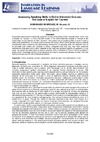Identificador persistente para citar o vincular este elemento:
https://accedacris.ulpgc.es/jspui/handle/10553/70751
| Título: | Assessing Speaking Skills in Online University Courses: The Case of English for Tourism | Autores/as: | Domínguez Rodríguez, María Victoria | Clasificación UNESCO: | 5701 Lingüística aplicada | Palabras clave: | Online university courses Assessment Speaking skills Oral presentations Rubric |
Fecha de publicación: | 2018 | Editor/a: | Libreriauniversitaria.it | Publicación seriada: | Conference proceedings (International conference ICT for language learning) | Conferencia: | 11th International Conference on Innovation in Language Learning | Resumen: | Summative assessment is especially useful for scoring and grading at the university level. In the case of English for Tourism —a core and ESP subject in the online Bachelor Degree in Tourism at the Universidad de Las Palmas de Gran Canaria— the assessment of speaking skills is done through a video (oral) presentation on a topic covered during the course. Since online classes require a special consideration when selecting and implementing assessment of speaking skills, the students have to be provided with models and samples to follow, alongside tools that may help them overcome performance difficulties and a rubric adapted to the level and expected results for guidance. In this paper, we explain the steps taken to assess speaking skills in students of Tourism that bring different levels of prior knowledge into the virtual classroom but need to acquire and develop, at least, a B2 oral fluency and accuracy for their professional careers. | URI: | https://accedacris.ulpgc.es/handle/10553/70751 | ISBN: | 978-88-85813-21-2 | ISSN: | 2420-9619 | Fuente: | Proceedings Of The 11Th Innovation In Language Learning International Conference, p. 87-90, (2018) |
| Colección: | Actas de congresos |
Visitas
366
actualizado el 15-ene-2026
Descargas
210
actualizado el 15-ene-2026
Google ScholarTM
Verifica
Altmetric
Comparte
Exporta metadatos
Los elementos en ULPGC accedaCRIS están protegidos por derechos de autor con todos los derechos reservados, a menos que se indique lo contrario.
